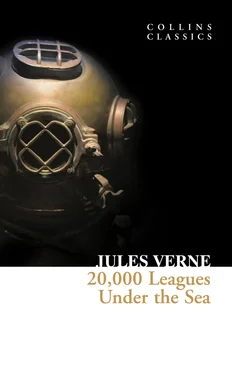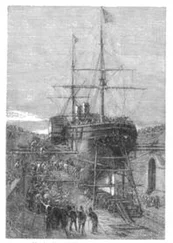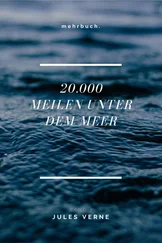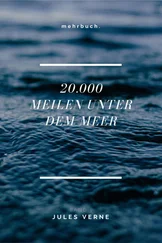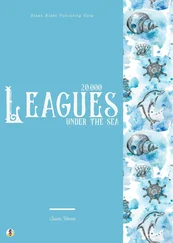‘If he is in a humour to hear them, Mr Land,’ said I, in an unconvinced tone.
‘Let me get within a length of four harpoons,’ answered the Canadian, ‘and he will be obliged to listen to me.’
‘But in order to approach him,’ continued the captain, ‘I shall have to put a whaler at your disposition.’
‘Certainly sir.’
‘But that will be risking the lives of my men.’
‘And mine too,’ answered the harpooner simply.
About 2 a.m. the luminous focus reappeared, no less intense, about five miles to the windward of the frigate. Notwithstanding the distance and the noise of the wind and sea, the loud strokes of the animal’s tail were distinctly heard, and even its panting breathing. When the enormous narwhal came up to the surface to breathe, it seemed as if the air rushed into its lungs like steam in the vast cylinders of a 2000 horse-power engine.
‘Hum!’ thought I, ‘a whale with the strength of a cavalry regiment would be a pretty whale!’
Until daylight we were all on the qui-vive , and then the fishing tackle was prepared. The first mate loaded the blunderbusses, which throw harpoons the distance of a mile, and long duck-guns with explosive bullets, which inflict mortal wounds even upon the most powerful animals. Ned Land contented himself with sharpening his harpoon – a terrible weapon in his hands.
Day began to break, and with the first glimmer of dawn the electric light of the narwhal disappeared. At 7 a.m. a very thick sea-fog obscured the atmosphere, and the best glasses could not pierce it.
I climbed the mizenmast and found some officers already perched on the mast-heads.
At 8 a.m. the mist began to clear away. Suddenly, like the night before, Ned Land’s voice was heard calling, –
‘The thing in question on the port quarter!’
All eyes were turned towards the point indicated. There, a mile and a half from the frigate, a large black body emerged more than a yard above the waves. Its tail, violently agitated, produced a considerable eddy. Never did caudal appendage beat the sea with such force. An immense track, dazzlingly white, marked the passage of the animal, and described a long curve.
The frigate approached the cetacean, and I could see it well. The accounts of it given by the Shannon and Helvetia had rather exaggerated its dimensions, and I estimated its length at 150 feet only. As to its other dimensions, I could only conceive them to be in proportion.
Whilst I was observing it, two jets of vapour and water sprang from its vent-holes and ascended to a height of fifty yards, thus fixing my opinion as to its way of breathing. I concluded definitely that it belonged to the vertebrate branch of mammalia, order of cetaceans, family…Here I could not decide. The order of cetaceans comprehends three families – whales, cachalots, and dolphins – and it is in the last that narwhals are placed.
The crew were waiting impatiently for their captain’s orders. Farragut, after attentively examining the animal, had the chief engineer called.
‘Is your steam up?’ asked the captain.
‘Yes, captain,’ answered the engineer.
‘Then make up your fires and put on all steam.’
Three cheers greeted this order. The hour of combat had struck. Some minutes afterwards the funnels of the frigate were giving out torrents of black smoke, and the deck shook under the trembling of the boilers.
The Abraham Lincoln , propelled by her powerful screw, went straight at the animal, who let her approach to within half a cable’s length, and then, as if disdaining to dive, made a little attempt at flight, and contented itself with keeping its distance.
This pursuit lasted about three-quarters of an hour, without the frigate gaining four yards on the cetacean. It was quite evident she would never reach it at that rate.
The captain twisted his beard impatiently.
‘Ned Land!’ called the captain, ‘do you think I had better have the boats lowered?’
‘No, sir,’ answered Ned Land, ‘for that animal won’t be caught unless it chooses.’
‘What must be done, then?’
‘Force steam if you can, captain, and I, with your permission, will post myself under the bowsprit, and if we get within a harpoon length I shall hurl one.’
‘Very well,’ said the captain. ‘Engineer, put on more pressure.’
Ned Land went to his post, the fires were increased, the screw revolved forty-three times a minute, and the steam poured out of the valves. The log was heaved, and it was found that the frigate was going eighteen miles and five-tenths an hour. But the animal went eighteen and five-tenths an hour too.
During another hour the frigate kept up that speed without gaining a yard. It was humiliating for one of the quickest vessels in the American navy. The crew began to get very angry. The sailors swore at the animal, who did not deign to answer them. The captain not only twisted his beard, he began to gnaw it too. The engineer was called once more.
‘Have you reached your maximum of pressure?’ asked the captain.
‘Yes sir.’
The captain ordered him to do all he could without absolutely blowing up the vessel, and coal was at once piled up on the fires. The speed of the frigate increased. Her masts shook again. The log was again heaved, and this time she was making nineteen miles and three-tenths.
‘All steam on!’ called out the captain.
The engineer obeyed. The manometer marked ten degrees. But the cetacean did the nineteen miles and three-tenths as easily as the eighteen and five-tenths.
What a chase! I cannot describe the emotion that made my whole being vibrate again. Ned Land kept at his post, harpoon in hand. The animal allowed itself to be approached several times. Sometimes it was so near that the Canadian raised his hand to hurl the harpoon, when the animal rushed away at a speed of at least thirty miles an hour, and even during our maximum of speed it bullied the frigate, going round and round it.
A cry of fury burst from all lips. We were not further advanced at twelve o’clock than we had been at eight. Captain Farragut then made up his mind to employ more direct means.
‘Ah!’ said he, ‘so that animal goes faster than my ship! Well, we’ll see if he’ll go faster than a conical bullet. Master, send your men to the forecastle.’
The forecastle gun was immediately loaded and pointed. It was fired, but the ball passed some feet above the cetacean, which kept about half a mile off.
‘Let some one else try!’ called out the captain. ‘Five hundred dollars to whomsoever will hit the beast!’
An old gunner with a gray beard – I think I see now his calm face as he approached the gun – put it into position and took a long aim. A loud report followed and mingled with the cheers of the crew.
The bullet reached its destination; it struck the animal, but, gliding off the rounded surface, fell into the sea two miles off.
‘Malediction!’ cried the captain; ‘that animal must be clad in six-inch iron plates. But I’ll catch it, if I have to blow up my frigate!’
It was to be hoped that the animal would be exhausted, and that it would not be indifferent to fatigue like a steam-engine. But the hours went on, and it showed no signs of exhaustion.
It must be said, in praise of the Abraham Lincoln , that she struggled on indefatigably. I cannot reckon the distance we made during this unfortunate day at less than 300 miles. But night came on and closed round the heaving ocean.
At that minute, I believed our expedition to be at an end, and that we should see the fantastic animal no more.
I was mistaken, for at 10.50 p.m. the electric light reappeared, three miles windward to the frigate, clear and intense as on the night before.
Читать дальше
